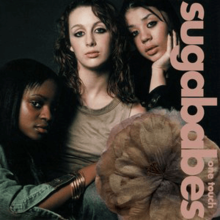
Back One Touch (албум) Bulgarian One Touch (Album) German One Touch Spanish One Touch French One Touch Hungarian One Touch Italian One Touch (ალბომი) KA One Touch Korean One Touch LT One Touch Dutch
| One Touch | ||||
|---|---|---|---|---|
 | ||||
| Studio album by | ||||
| Released | 27 November 2000 | |||
| Recorded | 1999–2000 | |||
| Studio | Bear Studios, Eastcote Studios, EMI Studios, Matrix Studios, Mayfair Studios (London) | |||
| Genre | ||||
| Length | 48:20 | |||
| Label | London | |||
| Producer |
| |||
| Sugababes chronology | ||||
| ||||
| Singles from One Touch | ||||
| ||||
One Touch is the debut studio album by British girl group Sugababes. It was released by London Records in the UK on 27 November 2000, and the following month in most other European territories. The trio worked with producer Cameron McVey on the majority of the album, which produced four singles; "Overload", "New Year", "Run for Cover", and "Soul Sound".
Despite initially peaking at number 26 on the UK Albums Chart and being certified Gold by the BPI,[1] and faring even better in German-speaking Europe, where it reached the top ten in Austria, Germany and Switzerland, the sales of One Touch did not meet the record company's expectations, and the group were eventually dropped in Autumn 2001,[2] making it their only release with the label. In addition, it became the only album featuring the group's original line-up until The Lost Tapes (2022). Siobhán Donaghy left the group in 2001. She initially stated that she wanted to pursue a fashion career, but was eventually diagnosed with clinical depression amid reports of in-fighting between the Sugababes members.[3]
In a March 2009 interview with Ponystep, group member Mutya Buena revealed that she thinks One Touch is the band's best work and that she still listens to it.[4] Donaghy has also stated in a separate interview that the album had been "ahead of its time".[5] In 2011, the original group members who released One Touch reformed under the new name "Mutya Keisha Siobhan", then resumed performing as the Sugababes after securing the legal rights to the name in 2019.
On 11 May 2021, Sugababes announced that a 20th anniversary edition of One Touch (originally planned for 2020 but delayed due to the COVID-19 pandemic) would be released later that year on 1 October.[6] That same day, they released the MNEK remix of "Run for Cover".[7][8][9][10] Following the album's reissue, it achieved a new peak of number 18 on the UK Albums Chart.
- ^ Cite error: The named reference
BPIwas invoked but never defined (see the help page). - ^ "Sugababes bio". 7digital.com. Archived from the original on 27 September 2007. Retrieved 7 October 2008.
- ^ "Sugababes history". BBC.co.uk. 21 December 2005. Retrieved 16 November 2006.
- ^ Tierney, Paul (9 March 2009). "To Tell You The Truth". Ponystep. Archived from the original on 6 August 2009. Retrieved 6 August 2009.
- ^ Siobhan Donaghy – we7[usurped]
- ^ "Sugababes announce reissue of debut album One Touch, talk new music plans". www.officialcharts.com. Retrieved 11 May 2021.
- ^ Subscribe (11 May 2021). "Metronomy, Blood Orange and more to feature on Sugababes' 'One Touch' 20th anniversary edition | News". diymag.com. Retrieved 11 May 2021.
- ^ Ryan, Gary (11 May 2021). "Sugababes tell us about celebrating 20 years of 'One Touch' and plans for new music - Check out the new remix of 'Run For Cover' by MNEK from the upcoming reissue of their debut, as the pop icons talk to us about their early days, Little Mix, racism and "going to work on something fresh"". nme. Retrieved 11 May 2021.
- ^ "Sugababes Announce 'One Touch' 20th Anniversary Edition / Premiere MNEK 'Run For Cover' Remix". thatgrapejuice. 11 May 2021. Retrieved 11 May 2021.
- ^ "Sugababes - Run for Cover MNEK Remix". iTunes. 11 May 2021. Retrieved 11 May 2021.